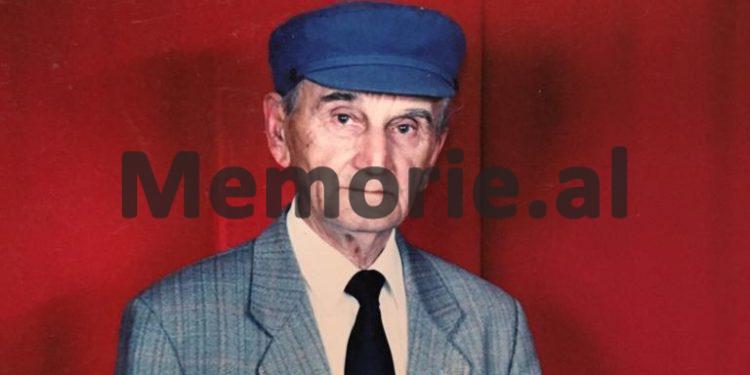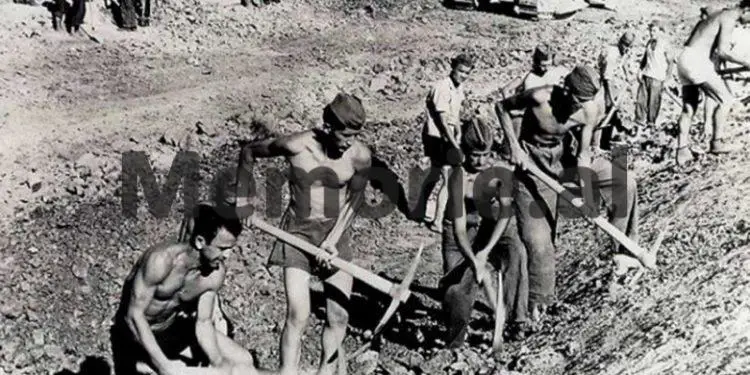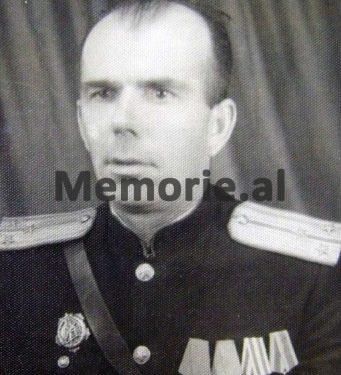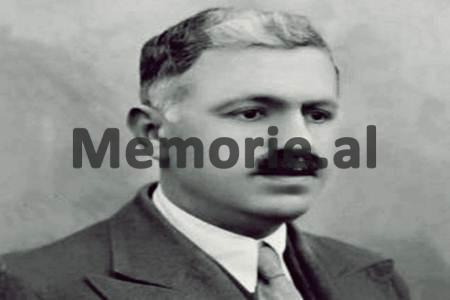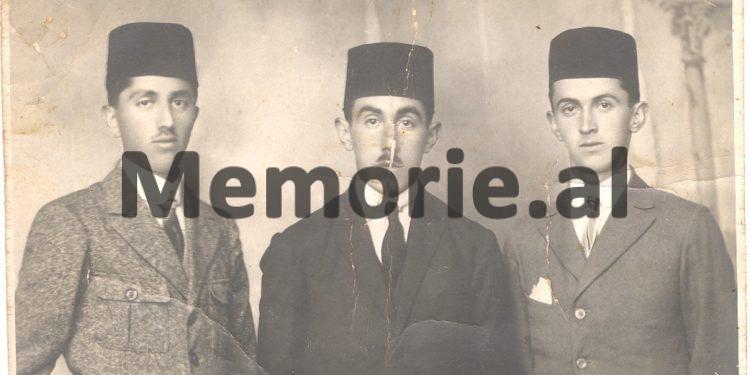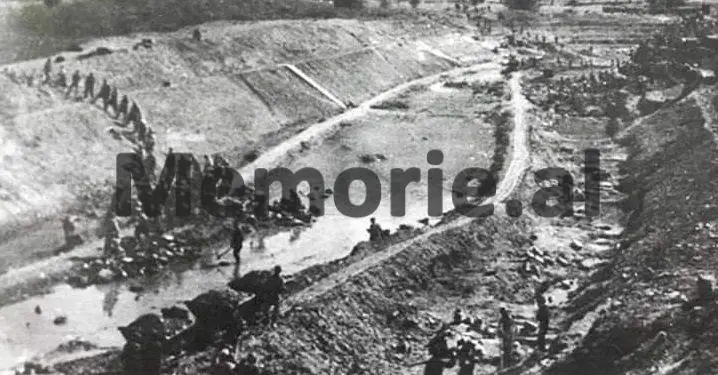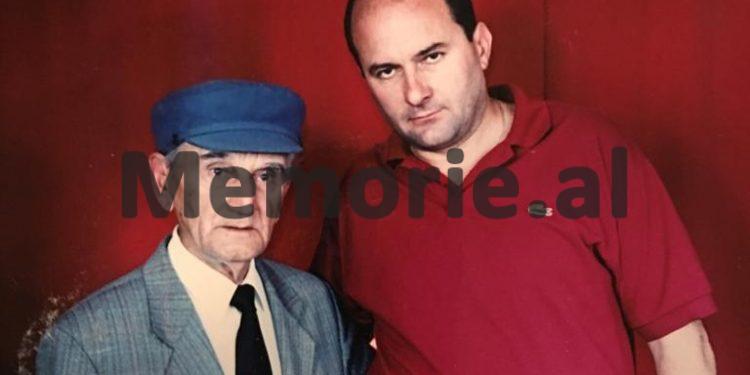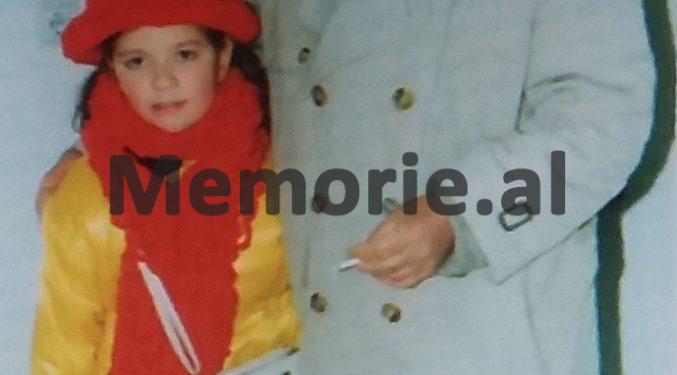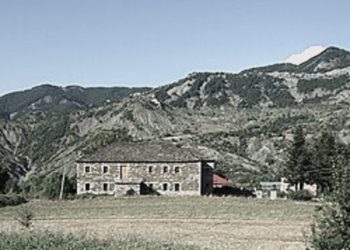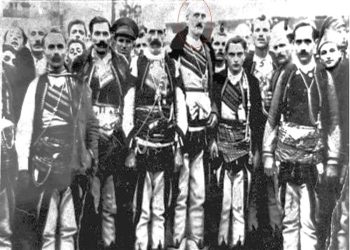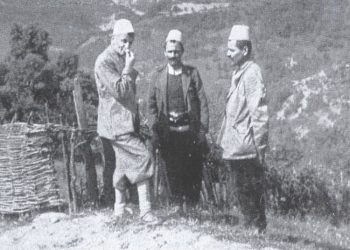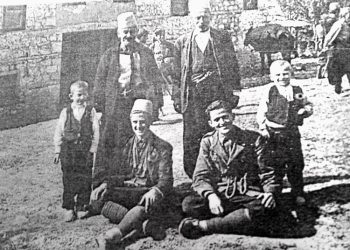Dashnor Kaloçi
Memorie.al publishes the unknown and highly tragic story of political prisoners who served their sentences in the horrific camp of Vlocisht in Korça district, where about 73 political prisoners were killed, as it was one of the most horrific camps opened in the regime. communist Enver Hoxha, wherefrom the inhumane treatment of the prisoners in that camp, many could not bear to commit suicide, going to death with complete conscience ?! One of them ran to the barbed wire, and Virtyt Gjylbegu from Shkodra, son of Hamit Gjylbegut, one of the most sworn-in anticommunists who never refused to participate in the polls …?!
Nearly half a century of communist rule in Albania, camps, and prisons was set up almost all over the country, serving sentences of tens of thousands, which Enver Hoxha’s communist regime had declared political opponents or “enemies of the people”. In those prisons and forced labor camps, Albanian and foreign political prisoners were treated with the most inhumane conditions, which cannot even be compared to the mass extermination camps set up by German Nazis in World War II. One of these camps was the one in Vlocisht in the Korça district, which opened in 1948 and killed about 73 prisoners, starving, inhumane or killed by police and guards at that prison. One of the former inmates of Vlocishte was Abdyl Hakan Banushi, originally from Golem of Gjirokastra, who many years ago in an interview we received told us about the horrors of that camp. Who is Avdyl Banushi, what was his past and how did he find himself behind bars and sent to serve his sentence in that camp?
Who is Abdyl Banushi?
Abdyl Banushi was born in 1928 in the village of Golem, Gjirokastra, from where his family originated. During the war years, he settled in the city of Durres to attend the gymnasium of the coastal city and there he joined the Anti-Fascist Movement. After 1943 he became associated with the youth of Balli Kombëtar and took an active part in several demonstrations organized by the nationalist youth of Durres at the time, where he was spotted by the Italian fascist authorities who included him in the lists of those who would be interned. After the capitulation of Italy, those lists fell into the hands of the Germans, who arrested Abdyl in 1944 and, along with dozens of others, interned them in extermination camps the Nazis had opened across Europe. In 1945, Banushi was able to be released from those camps with the help of Anglo-Americans, and from Germany, he arrived in Italy and then returned to Albania, where he was arrested on charges of being an Anglo-American agent. Due to his arrest, a letter was sent to him in the camp of Reggio Emilia, the former Prefect of Gjirokastra, Rasim Babameto, to take his men to Tirana. After that, Abdyli was sentenced to 20 years in prison and only released in 1961 after serving 16 years in the prisons of Enver Hoxha’s communist regime. After being released from prison, he was taken to the city of Fier, where he was arrested again after only a few days. Abdyli managed to escape from the Fier Internal Branch and after that from Albania and settled in the US. In 1974, he returned to Albania on a mission and, betrayed by a person who was with him, fell into the hands of the State Security somewhere at the Hani Hoti border crossing point and was sentenced to another 15 years. prison, being released on March 17, 1991, with the last political convicts who came out at that time, after serving 31 years in communist hell prisons.
Avdyl Banushi’s memories of the camp in Vlocisht
“The Vlocishte camp was opened in 1947 near the village of the same name after the Maliqi camp closed, it consisted of three large barracks guarded by machine guns and machine guns. We were the first 500 inmates to go to that camp (commanded by Tasi Marko at that time) where we worked about 12 hours a day in winter frosts (the temperature often reached minus 18 degrees) by opening canals and the food was just 700 grams of bread a day with a juice called soup. At the time of Camp Vlocish, terror and fear began to become commonplace, and many inmates thought about escaping or killing themselves. In one of those days, seven sufferers from this camp escaped, who was able to disappear in the reeds without anyone noticing. Their escape was only learned at dinner when they counted us and as punishment for what had happened, we were left out all night. So at dawn, they gave us a spoonful of soup and set us off for work. The same day another prisoner died in the water canal. When other friends saw his carcass, they started shouting and quitting. Upon learning of his death, camp commander Tasi Marko was notified, who immediately arrived and called for work to resume immediately, but that day no one refused to work. Tasi Marko left and then returned again with a group of civilians from the Recovery Enterprise and addressed the rebel group that had organized the halt, saying: “Listen, we saw the situation in the country and the prisoner must have been ill. But still, there are doctors who will do the expertise. It is no one’s fault, so you must continue to work otherwise we will take stringent measures. This is a forced labor camp and not a vacation camp. ” At that moment, a Catholic clergyman from Shkodra came forward and said, “We prefer death because this is dog life.” Tasi Marko chuckled and said, “Go on, go on” Cleric of Shkodra replied, “Lord Commander, I had so much, if you didn’t understand us, much worse for you.” No punitive measures were taken that day, but as lunch came and the soup bins arrived, the prisoners took their rations and began to eat all hunger. Even after lunch, no one refused to eat and we all stayed at the canal jetty. While we were there, a bodyguard heard a single automatic rifle. The bullet struck one of the prisoners, an elderly man in his seventies who was one of the organizers of the revolt and was working in the 4th Brigade. After that, the commander, Tasi Marko, ordered that the work be stopped and that we all return to the camp ahead of time. After taking with us the two victims of that day, we returned and were locked up in refuge, refusing to get dinner, ”recalls Abdyl Banushi, two of the many murders that took place in that terrible camp.
The human dramas that took place in the dark camp of Vlocisht
According to the accounts of Abdyl Banushi, the former prisoners in the Camp of Vlocisht, at that time besides numerous murders and deaths, one of the horrors that shortened the prisoners’ lives was hunger. Concerning this, he recalls: “The lack of food in that camp often caused macabre scenes of a man being bitten out of human nature. I never forget how the convicts rushed into the field, who and who first grabbed some skins that were thrown away by the freelance bonuses working there. There are real clashes there. The inmates hid the beetroot strips on their bodies and looked forward to eating them secretly. I never forget how gambling was played to earn a loaf of bread or a beet radish. Often times the dice were made with bread as much as a fingernail, which after the game and he ended up in the stomach of the one who won the game”.
The murder of Virtyt Gjylbegut
At that time, many suicides took place at Camp Vlocishte by prisoners who could not resist the terrible conditions that were there. In this connection, Abdyl testified: “The shock dramas suffered by the prisoners in that camp were often the cause of suicide, and I can never forget what happened to my handcuffed friend, Virtut Gjylbegun from Shkodra. The night before we were asleep since he seemed so depressed to me, I asked him what had happened to him. He replied, “Abdyl, is it worth living in these terrible conditions?” To raise the courage, I approached him saying that it was worth it and that life should be lived as it came to us. After that, he shrugged and said, “I didn’t expect this response from a cultured man,” and walked away telling me good night. That same night about two o’clock in the afternoon, the three policemen of our squadron, Hito Hitaj, Ali Gana and Skender Toskallari, sounded the alarm, shouting that a prisoner was running to the campsite in the restricted area where the barbed wires were. outer enclosure. Meanwhile, from the alarm that was made, the guard nearby fired a machine gun and the victim of that night was my friend Virtut Gjylbegu. The next day, a commission came from Korça to verify the incident, ”recalled Abdyl, about the killing of his friend who was hanged on the barbed wire of the camp in Vlocishte.
The protest of Professor P.SH.
But besides those prisoners who could cope with the great suffering of that camp, there were those who could not resist those horrors. Of one of these inmates, Abdyl recalled: “One Sunday the camp commander, Tasi Marko, entered the parade uniform. Usually, on Sundays he gave speeches but that day many inmates surrounded him and began complaining about the difficult conditions and the bad health they were in, demanding that the Camp Directorate allow their families brought cigarettes with food and clothes. While I was waiting for Tasi Marko’s frozen heart, he smiled lightly and with unprecedented warmth, he said he would see that problem. At that time an inmate ran and took the lead from the escort of the escorting prison commander, and forcibly slammed a group of convicts with open arms to Tasi Marko and said: “Please, Mr. Commander, listen to me too… I live in terrible conditions and can’t stand it, please. ” The commander groaned in his face and said: Who are you? The prisoner replied: I am Professor P. Sh. and I have been with the Nac-Çl War since 1941. In Shkodra I worked with my friends Sadik Boci, Sadik Bekteshi, Adil Çarçani, Sule Baholli, Qemal Gavoçi, and others. If you don’t, believe me, you can ask each of them. I’m suffering in jail in vain sir, I’m suffering from my brother’s mistakes with the caucus. I am innocent Mr. Commander, so please send me to Durres prison, because I am dying here. ” After all those prayers, Commander Tasi Marko came back with a nag: “You are no better than these others, working and fulfilling the norm that you are young.” As long as you are sentenced to forced labor you will do so, otherwise, there is worse. After that, the professor stopped crying and shouted, “I’m dying, I’m dying.” The commander fleeing returned: “One less enemy.” But at that time, the professor made a move and knelt before the commander, who looked up at him and said, “As long as you are one of those men that kneels to your enemy, I will return to prison by you have come to Durres. ” And at that time he turned to Lieutenant Qaniu to draft the professor’s transfer sheet. At that time many of the prisoners were ill and two of them Sh. Çelkupa and E. Podgorica, who had been sentenced to 20 years in prison and were hostile to the professor, wanted to get out of the line and punch him in the eye, but I kept them. But what the two could not do was another man who cut his way to the professor who was bowing his head towards the barracks and said: “You, Mr. Professor, with your shameful humiliation you have insulted all Albanian nationalism “! The professor raised his head and saw that the prisoner he was talking to was the intellectual E.Ç. The professor was really transferred to the Durres prison and after some time I learned that he had escaped from Albania.
Escape Failure…
During the time that the prisoners were serving their sentence in the Vlocishte camp, seeing the extremely difficult conditions they were in, some of them attempted to escape. But did they reach the goal? Concerning this, Abdyl Banushi recalled: “Many prisoners who did not endure the difficult conditions of the Vlocishte camp thought day and night how to escape. But seeing that many of the prisoners who had attempted to escape had been killed in the siege of thorns by the soldiers who shot and sacked them, a group of prisoners decided to make a tunnel through to whom they would go out of camp. For this, they assembled and assigned three workgroups of five (I was not in any of those groups), who would work late into the night. The tunnel would be opened using the drainage hole. After about a month, as four workers were working, they realized that they were approaching the surface of the earth, because the tunnel gorge had come out at the bottom of the steps of the soldier’s bodyguard. As they watched as they approached the long-awaited exit and the smell of freedom was at hand, one of them was told to return and alert friends. As they were returning, a large mass of soil collapsed and sank into the interior of the small tunnel. One of the prisoners, afraid of what was happening, jumped out. Meanwhile, from the noise that was beneath the watchtower, the service soldier was terrified and fled to a cornfield that was near the siege. When the second inmate came out of the hole, the guard yelled that people were coming out of the ground. Meanwhile, after the second, another prisoner emerged and all three ran into the cornfield walking with zikzak to guard against the volley of gunfire from the soldier who started shooting at them. All three were able to escape, and the fourth was trapped in the tunnel by other soldiers who immediately arrived there, ”recalled Abdyl Banushi in his confession about the failure of an attempted escape from the Vlocishte detention camp, where according to evidence of his own, died of starvation and inhumane conditions, or were killed by soldiers and police officers, about 73 inmates. Memorie.al





